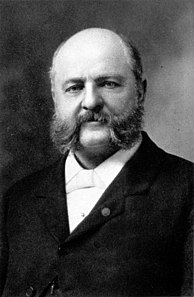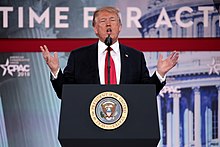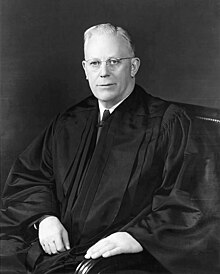Censorship in the United States
Andrew Hamilton defended him and was made famous for his speech, ending in "nature and the laws of our country have given us a right to liberty of both exposing and opposing arbitrary power ... by speaking and writing the truth.
[7] On March 3, 1873, significant censorship legislation, the Comstock Law, was passed by the United States Congress under the Grant administration; an Act for the "Suppression of Trade in, and Circulation of, Obscene Literature and Articles of Immoral Use."
"[15] On December 19, 1941, President Franklin Roosevelt signed Executive Order 8985, which established the Office of Censorship and conferred on its director the power to censor international communications in "his absolute discretion."
John W. Powell, a journalist who reported the allegations that US was carrying out germ warfare in the Korean War in an English-language journal in Shanghai, the "China Monthly Review", was indicted with 13 counts of sedition, along with his 2 editors.
The Child Online Protection Act, passed in 1998 and signed by Bill Clinton, was criticized and legally challenged by civil liberties groups, claiming that it "reduces the Internet to what is fit for a six-year-old.
The Supreme Court in 1978 in FCC v. Pacifica Foundation upheld the commission's determination that George Carlin's classic "seven dirty words" monologue, with its deliberate, repetitive and creative use of vulgarities, was indecent.
Fox, with the support of ABC, CBS, and NBC, argued that the commission did not give enough notice of nor properly explain the reasons for clamping down on fleeting expletives after declining to issue penalties for them in decades past.
"The commission could reasonably conclude," he wrote, "that the pervasiveness of foul language, and the coarsening of public entertainment in other media such as cable, justify more stringent regulation of broadcast programs so as to give conscientious parents a relatively safe haven for their children."
It is ironic, to say the least, that while the FCC patrols the airwaves for words that have a tenuous relationship with sex or excrement, commercials broadcast during prime-time hours frequently ask viewers whether they are battling erectile dysfunction or are having trouble going to the bathroom...
The association was headed by Will H. Hays, a well-connected Republican lawyer who had previously been United States Postmaster General; and he derailed attempts to institute federal censorship over the movies.
He recruited Father Daniel Lord, a Jesuit priest and instructor at the Catholic St. Louis University, to write such a code and on March 31, 1930, the board of directors of the Motion Picture Producers and Distributors Association adopted it formally.
Billy Wilder's Some Like It Hot (1959) and Alfred Hitchcock's Psycho (1960) were also released without a certificate of approval due to their themes and became box office hits, and as a result further weakened the authority of the code.
See: Marsh v. Alabama (1946) 326 U.S. 501[56][circular reference];[57][58] The U.S. Communications Decency Act of 1996 (CDA) sought to regulate pornography on the Internet, making it a crime to transmit "obscene or indecent" material to anyone under the age of 18.
[68] In 2022, the state of Louisiana passed Act 440 requiring a government ID to access websites if more than thirty-three and one-third percent of their total material is deemed harmful to minors, which went into effect on January 1, 2023.
Some Department of Homeland Security staff say the ban is hampering their work: "More damage will be done by keeping the federal workforce largely in the dark about what other interested parties worldwide are going to be reading and analyzing."
The Monterey Herald reported on June 27, 2013,[89][90] that the United States Army bars its personnel from access to parts of the website of The Guardian after their revelations of whistleblower Edward Snowden's information about global surveillance.
The American Civil Liberties Union complained that Section 505 of the USA PATRIOT Act removed the need for the government to connect recipients to a terrorism investigation, widening the possibility for abuse.
On November 7, 2005, the American Civil Liberties Union (ACLU) reported:[93] According to the Washington Post, universities and casinos have received these letters and been forced to comply with the demands to turn over private student and customer information.
The legislation amended the existing NSL power by permitting the FBI to demand records of people who are not connected to terrorism and who are not suspected of any wrongdoing.On February 17, 2006, former U.S. Secretary of Defense Donald Rumsfeld stated, that:[94] in this war, some of the most critical battles may not be fought in the mountains of Afghanistan or the streets of Iraq, but in the newsrooms in places like New York and London and Cairo and elsewhere.
I believe with every bone in my body that free people, exposed to sufficient information, will, over time, find their way to right decisions.The Protect America Act of 2007 was also controversial for its lack of judicial review.
The TRA does not "prohibit" conduct, but denies tax benefits ("penalizes") for certain types of boycott-related agreements.On this basis, some American businesses have been punished for answering their customers' question about origin of their products.
Material attempts to suppress speech through induction of state action under false pretenses, such as by claiming a domestic boycott campaign is foreign in origin may be unlawful, and may constitute conspiracy against civil rights, a federal crime, punishable by fine and imprisonment.
Nichols and McChesney[126] opine that "the maniacal media baron as portrayed in James Bond films or profiles of Rupert Murdoch is far less a danger than the cautious and compromised editor who seeks to 'balance' a responsibility to readers or viewers with a duty to serve his boss and the advertisers."
They state that "even among journalists who entered the field for the noblest of reasons" there is a tendency to avoid any controversial journalism that might embroil the news company in a battle with a powerful corporation or a government agency.
The arrest of Russian programmer Dmitry Sklyarov in 2001, for alleged infringement of the DMCA, was a highly publicized example of the law's use to prevent or penalize development of anti-digital rights management measures.
[136] Since the 1964 decision in New York Times Co. v. Sullivan, public figures like entertainers and politicians must prove actual malice was intended as opposed to simple negligence to win a libel or slander suit.
"[142] Following the overturning of Roe v. Wade in 2022, several Republican state legislatures began introducing bills written by the National Right to Life Committee which criminalize the dissemination of information on how to obtain an abortion.
On January 4, 2007, US District Court Judge Jack B. Weinstein issued a temporary restraining order forbidding a number of activists and their organizations in the psychiatric survivors movement, including MindFreedom International and the Alliance for Human Research Protection from disseminating ostensibly leaked documents purporting to show that Eli Lilly and Company knowingly concealed information on potentially lethal side-effects of Zyprexa for years.
The Electronic Frontier Foundation came to the defense of one of the parties silenced by the restraining order to defend the First Amendment right of Internet journalists to post links to relevant documents on wikis, blogs, and other web pages.
State laws prohibiting "sedition" were also passed and used to prosecute and persecute alleged "seditionists" during this period, including many people guilty only of being "Wobblies", or members of the Industrial Workers of the World.





Source: Reporters Without Borders







